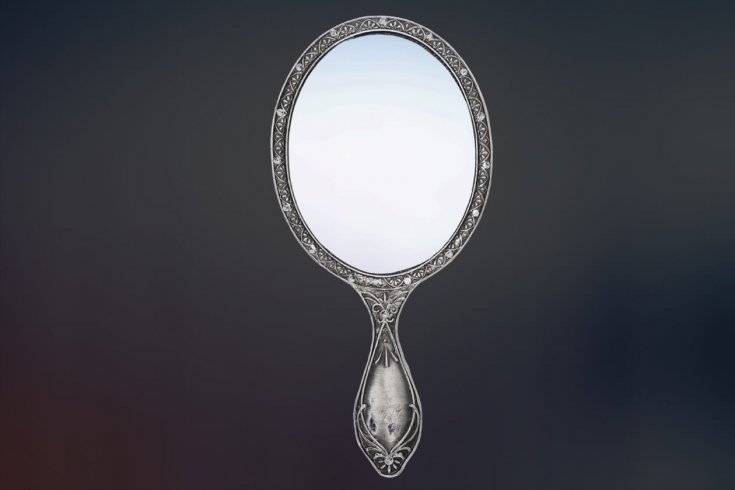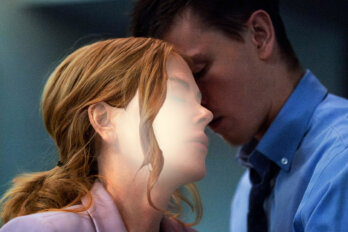The other night, I saw two raccoons fucking on my neighbour’s roof. I was just going up to bed, happened to glance out the window, and there they were. The male was mounting the female from behind, her tail was stretched straight out backwards, his front paws were scrabbling at her sides, and he seemed to be struggling a bit, starting and stopping, as if unable to get a satisfactory rhythm going. They were on the very peak of the roof, their bodies silhouetted in pure black against the deep midnight blue of the sky, and above them was a slim, bright fingernail moon.
Now this, it occurred to me, is the sort of thing one could write a poem about. I would introduce a few comparisons—the sky as blue as a woman’s velvet dress, say, and the moon standing out against it like a link in a bright silver necklace. Too high flown? Too literally connected to the dress? Something more prosaic—perhaps the moon was like the bright curved indent a badly aimed hammer leaves on metal. Yes!
Are you interested in this story? Not really? It would be perfectly fair for you to say: “look, Brooke, not everything that happens to you needs to be made into a poem.” And you would be right. Much of contemporary poetry has become something of an assembly line, turning out verbal representations of minor occurrences in the poet’s daily life. Most formulaic are the lyric poets, who often come across like oversensitive souls wandering the world logging every detail of every impression that strikes them—the iridescent feathers of a bird they saw on the way to work, the metallic screech of the streetcar that woke them up in the middle of the night, the ugly tile pattern in the bathroom where they hid to avoid talking to anyone at a party. The lyric is, in a sense, the selfie of the poetry world: it provides a perfectly contrived snapshot of the poet at a moment in time.
As a result, there’s a good argument to be made that the dominance of the first-person poem has killed off the rich possibilities available to poets. Formal poetry, narrative verse, satirical verse or light verse, dramatic verse—all these options have, with a few exceptions, largely vanished from mainstream poetry. Poems now are almost exclusively concerned with the feelings of a speaker who appears to be, at most, a slightly distanced version of the poet. This predicament becomes more evident when it is multiplied across an entire industry, with thousands of personal lyrics published year after year. That doesn’t make all personal lyric bad; in fact, most (published) contemporary poetry is not characterized by badness at all but rather by a professionalized mediocrity that flattens the language until everyone sounds the same.
Montreal poet Michael Harris has spent much of his career worrying about that problem. His most recent collection, The Gamekeeper, which brings together the best of his poems since his books first began appearing in the mid-1970s, has a lot to tell us about the forms that poetry has taken—and not taken—in Canada over thirty-five years. A great deal of the writing in the collection fits comfortably in the mainstream tradition of the personal lyric and shows Harris to be a poet of his time. When Harris goes travelling, he writes about travel. When he goes to an art gallery, he writes about paintings. When he becomes a parent, he writes about his children. The impulse toward this kind of poetry is perfectly natural. Who, after all, do we find more interesting than ourselves? Lyric poetry feeds this narcissism, telling poets they’re special individuals whose perceptions are so finely honed that they can transform banal observations and quotidian dramas into art simply through the force of their presentation.
Other poems in The Gamekeeper, however, show a very different poet: one looking for alternatives to accepted modes and often trying to adapt the lyric voice to different ends. Indeed, one of the most fascinating parts of reading The Gamekeeper is watching Harris move restlessly inside the conventions of lyric, pushing at the edges, attempting to branch out. One can hear him repeatedly ask himself: What can lyric poetry do? How far can its voice be stretched before it snaps?
Lyric poetry dates back to the “solo song” of ancient Greece, when poets like Sappho would sing their verse, often accompanying themselves on string instruments like the barbiton or lyre (hence “lyric”). This type of verse was often highly personal and devoted to airing the poet’s emotions. It’s important to remember, however, that Greek lyric existed as part of a larger poetic tradition that included not only massive narrative poems, such as the Iliad and Odyssey, but also the didactic poetry of Hesiod, philosophical poetry, and epigrams. The same situation held for a significant portion of English poetry: there was plenty of work we would classify as lyric (Shakespeare’s sonnets), but poets were also busy composing narrative poems (both epic and mock), satire, dramatic verse. Lyric was just one mode among many.
The latter part of the Romantic era, however, featured a showdown between lyric and poetry’s other forms. We could see it as a conflict between two major poets, Byron and Wordsworth. Byron’s output represented a broader idea of poetry that included lyric alongside satire, epigram, narrative verse tales, and even a verse novel, Don Juan. Wordsworth represented the narrowing of poetry to two main subjects: the natural world and the self. He eschewed formal experimentation and used his surroundings to channel his feelings and observations (“I Wandered Lonely as a Cloud,” is maybe his most famous piece). Spoiler: Wordsworth won, and English poetry is still living out the consequences of that victory.
For much of his career, Harris has found himself, sometimes uneasily, in the Wordsworthian stream. His early collections, Sparks and Grace, from 1976 and 1977 respectively, are full of observations of the pastoral world. His titles are enough to give you a sense of the books’ rural setting: “Barn Swallow,” “Shadfly,” “Frogs Courting,” and “Rabbit.” The poetry’s apparent simplicity, however, masks a quite sophisticated verbal music, in which Harris often buries his rhymes midline so that we hear them in the background. Or he compresses his similes into a single word by using a noun as a verb, as when “Nightcrawlers concertina back into the black / of their holes,” or “A huge truck monsters up a hill,” or “A swallow spitfires by.”
Beyond the formal elements, this is a poetry of pure description: Harris concentrates closely on what’s before him in order capture it in the most vivid way possible. Harris sees the sun as “a deep-red egg nested on an edge / of blue gauze.” A moth, on a wall, is “skittish / as a feather-duster.” The poems of Sparks and Grace are models of how a lyric poet can approach writing about the natural world. The quality and duration of Harris’s attention are evident in similes so well chosen and precise that they awaken us to a similarity or convergence that seems inevitable even though we hadn’t thought of it before.
But can a poet go on writing descriptive lyrics forever? Grace ends with “Death and Miss Emily,” a fascinating, long poem that draws extensively on Harris’s visual gifts but also attempts to combine them with extended narrative. The poem is written in the third person, bringing together Emily Dickinson and the personification of death that Harris borrows from her poems in a tightly defined storyline, in this case, the last day of Dickinson’s life as death prepares to rendezvous with her. It is, you could say, a fictionalized biography with allegorical elements woven in. The nature imagery and metaphor making of the earlier poems continue here, though this time Harris uses the imagery to create a kind of flux in which his metaphors move in two directions at once so that the natural world illuminates the human, and the human illuminates the natural. So Miss Emily’s hands “have wrinkled finely / like a snake’s back,” or “the head on her shoulders / is dull as a turnip,” or this:
The doubt struggles carefully
like an eel in thick weedsand brushes the hairs of shiver
that stiffen on the nude neck of Miss Emily.
Then there’s also this: “The glaze of the moon is a lighter liquid set loosely / on the mercury of water.” That is simply gorgeous and also perfectly apt, and with the added beauty of the liquid L sounds running through the line, it’s hard to imagine a better description of the way moonlight reflects on the surface of water. Those sublime moments of description stand out in “Death and Miss Emily,” and the sequence is successful in creating an atmosphere of uncertainty and hovering menace, as death watches over Miss Emily and gradually draws closer to her, using the world of nature to send her signs of his coming.
In its experiments with narrative, “Death and Miss Emily” showcases Harris’s ongoing struggle with his Byronic side—the side that understands that poets need to do more than churn out the same kind of poems. The Byronic side also reckons with a related question: Is a poem worth writing? Which, of course, is another way of asking whether it is worth reading. Poems make a demand on our attention, so it’s fair for readers to wonder: “What’s in it for me?” A poem invites us to listen. But does it compel us to do so?
Given its placement at the end of Grace, “Death and Miss Emily” appears to mark Harris’s attempted shift out of the personal lyric. But Harris’s attempts to break away from lyric often end up confirming its hold on his work. We can see this in Harris’s next long poem, “Turning Out the Light,” which is taken from In Transit, published in 1985, and deals with the death of the poet’s brother from cancer eight years earlier. The poem picks up the narrative mode of “Death and Miss Emily” but is harrowing in its visceral realism. It also has more narrative impulse than “Death and Miss Emily,” mainly because the stages of his brother’s death give the poem a shape and a sense of inevitable forward progress, however grim it may be.
The earliest sections of the poem are written in the third person, telling the story from the perspective of the dying brother. These parts are interesting in the way Harris develops little novelistic scenes, showing the main character looking his own disease in the face. This opens up intriguing narrative possibilities as we sense that we are going to be taken through the stages of a dying man’s experience of death. These opening sections also suggest the possibility of a type of poem that is, for Harris, new and unfamiliar and, for that reason, exciting.
But toward the end of the poem, the inevitable “I” enters the picture, and the rest of the series is shaped by the poet’s experience of his brother’s death. Harris’s writing here reaches the highest pitch of emotional power, conjuring up the world of a man suddenly confronted with his mortality. While the personal stakes give the poem a greater intensity, it also feels more conventional than “Death and Miss Emily.” Where the earlier poem represented a real break from autobiographical subject matter, “Turning Out the Light” returns to the poet’s own life. That doesn’t mean there isn’t some beautiful and affecting writing, as these lines, from the moments after his brother’s death, demonstrate:
I touch his forehead, still warm,
in a blessing useless to anyone
but me; and brush the damp hair
out of his eyes, thinking
how extraordinary it is
that he has no breath.Your eyes were wide open
when the world fell away,
my lovely brother.
But these lines also show that Harris has, once again, put himself and his own perceptions at the centre of a poem. “Turning Out the Light” ends up feeling conventional not because of Harris’s shortcomings as a poet but because of the inherent limitations of his lyric voice. Harris fails to complete the step he seemed to take at the end of Grace.
Harris tries again in his 1992 New and Selected Poems, with “Spring Descending,” a series of mostly fourteen-line poems strung along a single narrative thread: the story of an affair between an older man and a younger woman. The form suggests that Harris is responding to the sonnet sequences popular in the Renaissance, except that he shifts the focus from the courtship phase to the middle and end of the relationship. This seems like a promising set-up—the sort of thing countless caustic short stories are made of. The poem seems like an ideal opportunity to trace the way a relationship falls apart—we could see signs that the woman is losing interest in the man, for example, or we could be made to realize that she has her own reasons for being in the relationship that he isn’t aware of.
But Harris remains stuck in his male speaker’s head: the young woman never says a word and is not characterized beyond her physical appearance, so the depiction of the relationship is incomplete. We don’t feel the woman’s uniqueness, which means the speaker’s expressions of intense emotion (“please God,” “O Lord,” and so on) come off as bathetic because we don’t see any convincing reason for them, and so we can’t believe in them. What, after all, do we really know about this woman? She’s younger, she cooks and cleans, she fills out a bathing suit. These qualities amount to an object, not a character. Here’s a poem that gets to the nub of things:
Other things go about their lives
simply; that is, there are
now buds in a red mist
hanging aloft in the maples,millions of maples, millions
of buds misting in the air
which in a week will break
into green along the highwaythat took us here from town.
And will bring us back, but
not now, not for a day or two,
please God, my face has thawedand I am capable of sight, my senses
all my senses have come back to me.
This poem is perfect in that it captures the entire spectrum of Harris’s work: the first two quatrains are lovely, with the image of the maple buds blending into a red mist in the air recalling his fine sense of how to describe nature from the early poems. But then we land with a thump in the tired cliché of the older man rejuvenated by an affair with a younger woman. This is like an alchemist who spins gold and then transforms it into lead.
The final poems in The Gamekeeper are taken from Circus, published in 2011, and they confirm that Harris becomes a much more engaging poet the further he moves from the personal lyric. About half of these poems form the literary equivalent of a concept album dealing with members of a circus troupe. Two elements that have occurred occasionally in the earlier poems become more dominant here, and they represent a significant break: poems written “in character,” so to speak, and a formalism that, until this point, has been more or less latent. Here are the first two stanzas of the “Ringmaster”:
The vinegar smell of piss-yellow straw.
The three teeth left in the old lion’s jaw.
The girl on the pony with the jiggly bits.
The loaves of manure the elephant shits.The beer-sticky stains Velcroing seats.
The gossamer meat of the candyfloss treats.
The Chinese contortionist popping her hip.
The cuckolded acrobat losing his grip.
This scene setting presents a portrait of a character and his milieu, and the “cuckolded acrobat” even hints at the narrative possibilities of the small dramas that go on behind the scenes in closed communities like circuses. The other circus poems in the collection give voice to the various characters who populate the world sketched out in “Ringmaster.” Here is “The Bearded Lady”:
I shaved, once. All over. Took a lover
much younger than me—and not for his
conversation. I wanted the feel of a tongue
running over a mouth, slowly—but not
his tongue over my lips, not mine over his:
I wanted his whole body licking like a tongue
over every new surface of mine. Trouble was,
my stubble. The kid got rug-rash. Carpet-burn.
By the end of the night, the boy looked—uncooked.
When his own sweat began to roast him in salt
he fled to the showers. Haven’t seen him since.Some time later I married a man
with a skin condition. The soft moss of my belly,
the fur on my face—all titillate the scaly
hide of The Alligator Man. I’m prickly and hirsute.
He’s tough as shoe leather. Neat,
how things turn out.
Harris has played with this ventriloquizing technique a few times before, most notably in “Killing the Beast,” which is written in the voice of Raphael as he discusses how he went about painting Saint George and the dragon. This and the other poems like it show Harris successfully finding another way out of the trap of writing about his life, this time using the first person voice to tell the story of a character clearly external to himself. Another one, “Mephisto, The Human Pincushion,” is told in the voice of a circus performer who, like Chaucer’s Pardoner, is so voluble he can’t resist bragging about how his trick is done. As the book goes on, the poems echo one another, and while they don’t create a narrative in the truest sense, they do give the impression of an external reality populated with actual characters—something well outside the confines of the poet’s own experience.
Narcissism is an infinitely renewable resource, and people won’t stop writing poems about their own experiences and emotions. In fact, in just the last few years, platforms like Instagram have enabled a significant increase in the number of people reading and writing poetry. This creates a broad but shallow poetry world, with more and more people all doing the same thing: talking about themselves. Expanding the echo chamber is great, but it’s still an echo chamber.
The transformation in Circus, with its character writing and its formalism, shows that Harris remains restless, still producing work that expands on his career-long interrogation of the possibilities of poetic form. It’s to Harris’s credit that he engaged in this effort at all. The Gamekeeper makes us witnesses to how difficult the struggle can be and to how the dominance of personal lyric—in making a certain way of writing almost instinctive or automatic—diminishes the possibilities of poetry by erasing, through its very dominance, other options. Harris himself has said that “it is the inward turning eye that produces the most significant verse,” which is a manifesto for personal lyric if ever there was one. Fortunately, The Gamekeeper shows us that Harris’s work is more complex and interesting than his statements about it.




